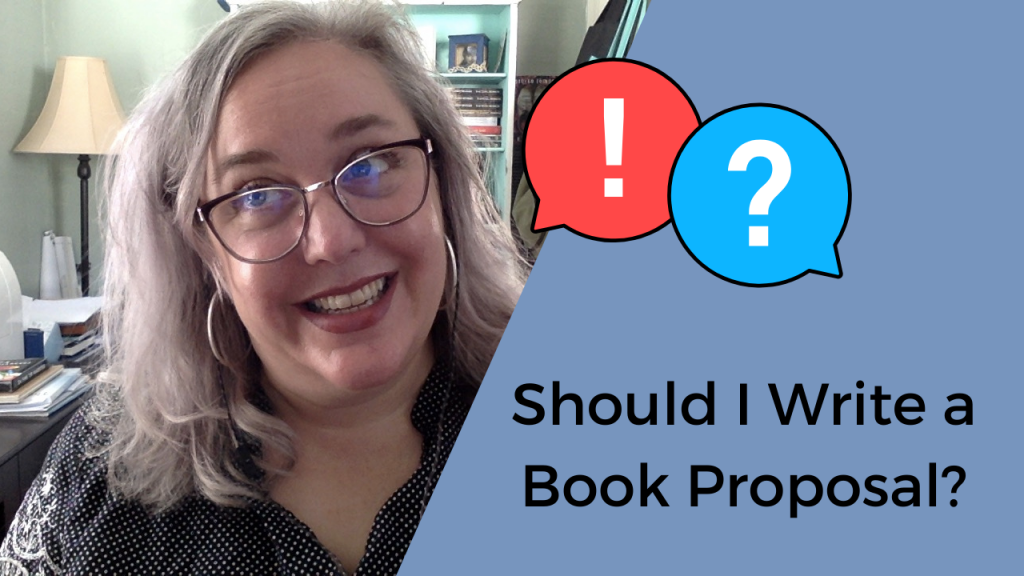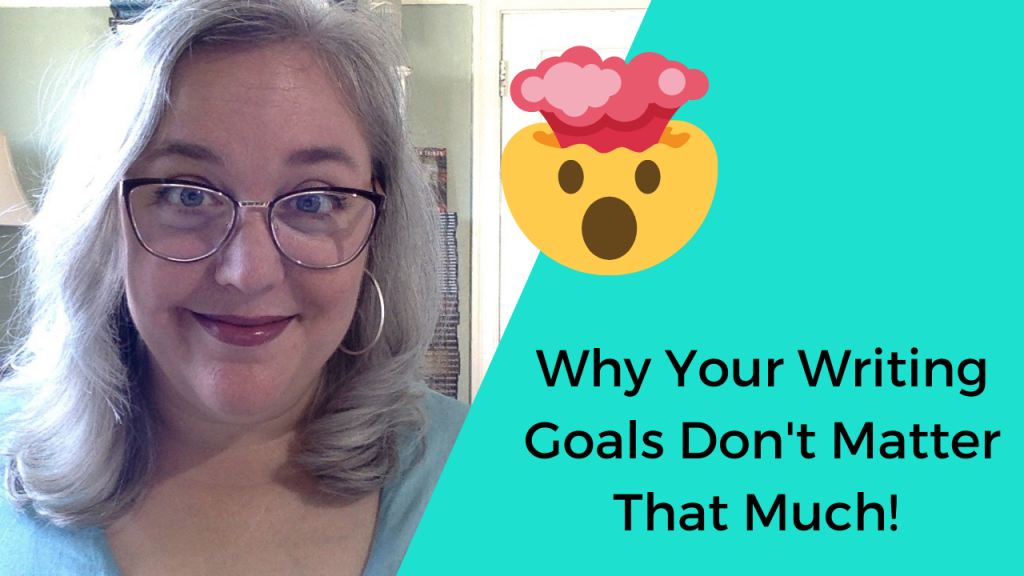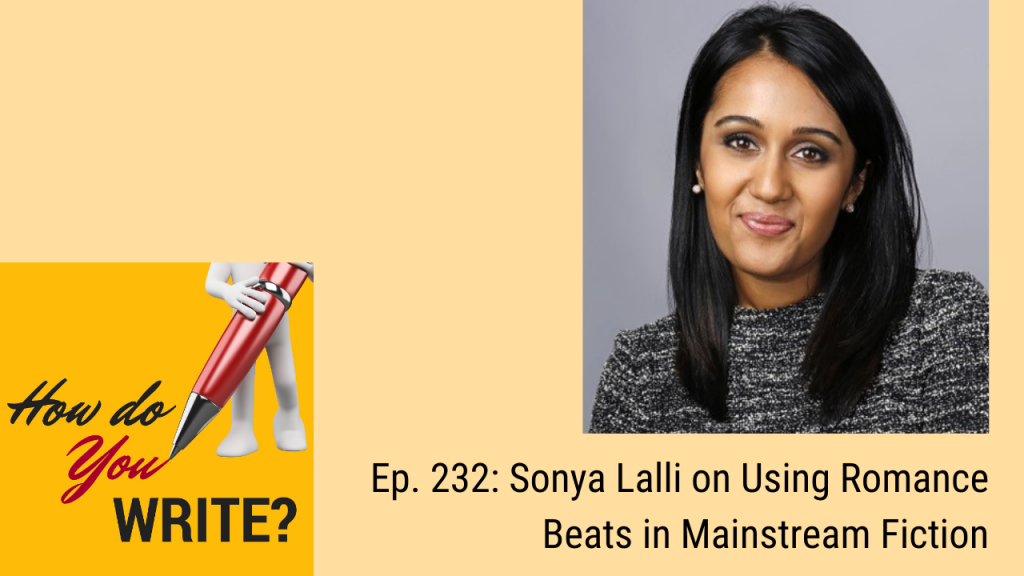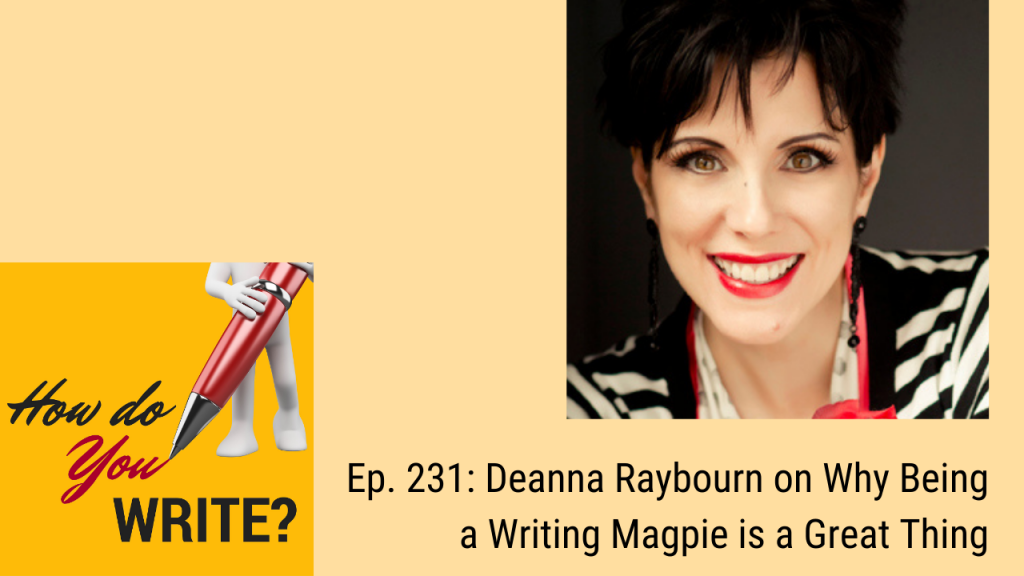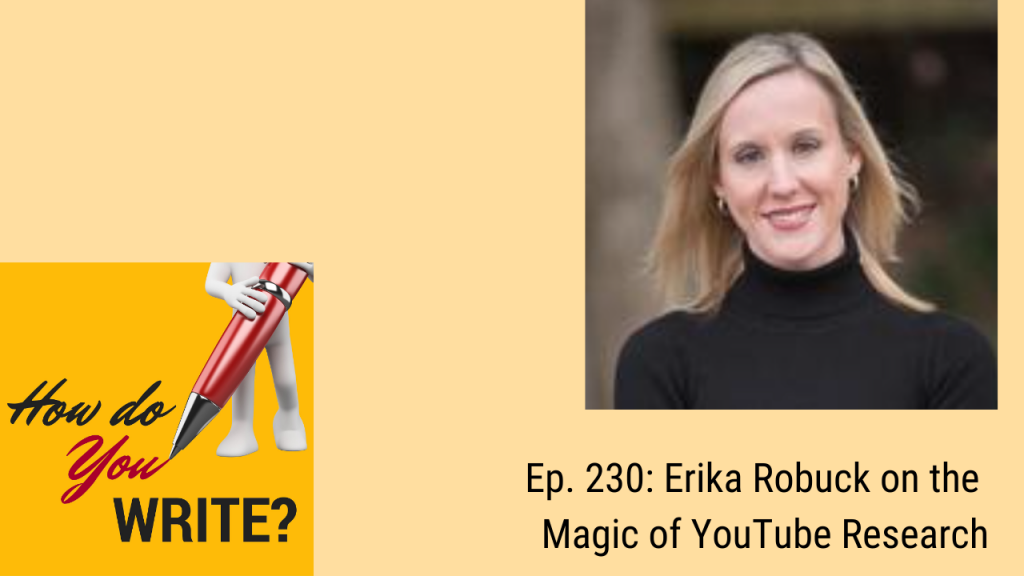Nancy Stohlman is the author of four books of flash fiction including Madam Velvet’s Cabaret of Oddities (a finalist for a 2019 Colorado Book Award), The Vixen Scream and Other Bible Stories (2014), and The Monster Opera (2013). She is the creator of The Fbomb Flash Fiction Reading Series and FlashNano in November. Her craft book, Going Short: An Invitation to Flash Fiction, is forthcoming from Ad Hoc Fiction in 2020. She teaches writing and rhetoric at the University of Colorado Boulder. When she is not writing flash fiction she straps on stilettos and becomes the lead singer of the lounge metal jazz trio Kinky Mink. She dreams of one day becoming a pirate.
How Do You Write Podcast: Explore the processes of working writers with bestselling author Rachael Herron. Want tips on how to write the book you long to finish? Here you’ll gain insight from other writers on how to get in the chair, tricks to stay in it, and inspiration to get your own words flowing.
Join Rachael’s Slack channel, Onward Writers!
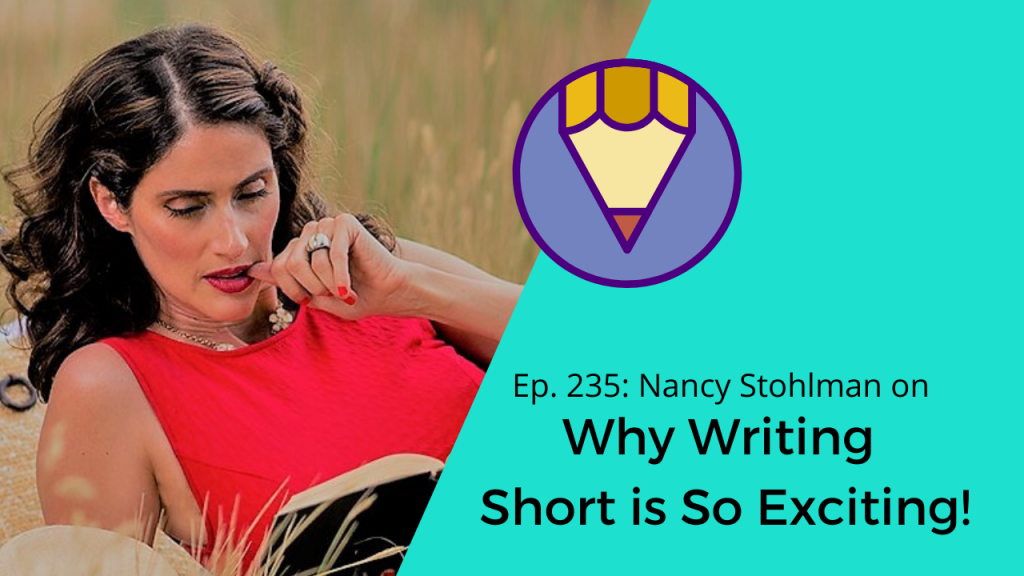
Transcript:
Rachael Herron: [00:00:00] Welcome to “How do you Write?” I’m your host, Rachael Herron. On this podcast, I talk to authors about how they write, what their process is and how their lives fit together. I’ll keep each episode short so you can get back to writing.
[00:00:16] Well, Hello writers! Welcome to episode # 235 of “How do you Write?” I’m Rachael Herron, and I am thrilled that you’re here with me today as I speak to Nancy Stohlman on why writing short, and I mean, short, short, short is so exciting. I found this conversation completely fascinating, and I hope that you do too. So she was a delight, please stick around for that. What’s going on around here? Well, the move continues a pace, we did a pretty- not pretty, a very difficult thing. This last weekend, when we gave our kitty Waylon to someone who’s adopting him and it was one of the hardest things I’ve ever done. And I know that sounds over-reactive if you are not an animal person, but if you are, you understand. Waylon is too old to make the trip safely. Cats just die. His age, either during the flight or during the quarantine, and we can’t do that to him. Waylon is also the one that lost his dog this, you know, a couple of months ago, also lost his twin brother about a month ago. So, rehoming him was so much harder than it normally would have been because we felt like we were stripping everything from him, which we were, and it was awful, but, we took him to a home with three incredible, adorable, smart kids who just want to love him. And Waylon is just made of love and apparently he’s just been loving everybody in the house and fitting in and we’re crossing our fingers. But it works out really well and that he stays there and, that’s why we did it early. [00:01:59] So they have some time to take him for a test run although I don’t think they have any interest in taking him for a test run. I think they have adopted him wholeheartedly and that makes me feel good and it makes me sad, but we are one- I think that was honestly the hardest thing we’re going to have to do in this move. I could just say goodbye to my sisters and my people, because I can talk to them. I can continue talking to them on zoom. I can come back and see them. You can’t explain this kind of thing to a little old man cat. So, yeah, I’m glad that’s done because it was excruciating. What else is going on around here? Well, I just finished doing our taxes and this was the best year ever since I talked about that in my money show at the beginning of the year, but it’s always a little bit different in April when my tax person says, oh, and don’t forget, you made this here, and you made that. And here’s your, what you made- net and she just pointed out to me couple hours ago, the year that I went full time, 2016, I netted $20,000 from my writing business. And in 2020, 4 years later, I netted $160,000. That’s after expenses. So that’s amazing! That’s so awesome. And I am proud of myself and I am happy and grateful. And I wanted to take this moment to talk to you a little bit about money. And I’ve said this before on the show, and I will say it again, but this is for you, if you want to be a full-time writer. And by that, I mean, if you want to be a person who sustains financially half or more, of a household. [00:03:46] I needed to continue to bring in my half of the mortgage and our half of the bills. And we live in the bay area and it’s expensive. And honestly that first year of 2016, that net did not cover what I needed, we had to go a little bit in the savings then I believe if I’m remembering correctly, I know that I needed to bring in $36,000 a year, when I left the job in order to cover those things. And here is what that looks like: If you want to be full-time, if this is something that you must bring in money to support your family or yourself, there’s one thing that you have to do. There’s a few things, but the most important thing you have to do is get out of debt. And I know that we don’t talk about that enough in America or, you know, anywhere really, but debt is one of those things that so many people carry around. And they don’t talk about it because it’s shameful. And by carrying it around and being ashamed of it and not talking about it, it gets worse and worse and worse. And I have a set on the show and I’ll say it again. I think our deepest in debt moment was not including our house. We were $125,000 worth of dollars in debt. That included an IRS bill, my student loan, 40 or $45,000 worth of credit card debt and something else. Now, maybe it was just those three things. We have never carried any money on the cars because we drive hoopies, and that’s okay. That’s what we like. But that was a lot of debt and that is why I worked a full-time job. And I wrote for the first, for six or seven years after I was first published. Yeah. Six years. My first book came out in 2010. So I’d been getting paid for writing since about 2008 when I sold my first book and I continued to work double full-time jobs until 2016 in order to get out of that debt. And I just wanted to put a plug in for a tool that is how we got out of debt. I’m not affiliated, I’m not getting any kickbacks for this, but YouNeedaBudget.com YNAB, Y-N-A-B. YouNeedaBudget.com is life-changing, I didn’t start using it until I was late thirties and I only started using it because best friend Sophie Littlefield was also really struggling with money after being divorced and winding up broke with nothing to show and no way of understanding how money works and how to take care of ourselves. [00:06:34] And somehow I got into our late thirties and I’ve always been the one who does the bills, but I just didn’t understand how money worked. And I didn’t understand how much I needed to save and put away and not spend every month because of the bills that were going to be coming. Like I’m a smart, intelligent person. I thought I always knew what was coming and yet, we were always clap caught flat-footed we were always needing to use the credit cards because we just weren’t gonna make it through that at the end of that month and this is nothing to be ashamed of. This is normal. I’m going to look up a stat. I found it. It is from a study by the federal reserve. This came out last year. Almost half of American adults would not be able to cover a $400 emergency with cash from savings. That’s almost half of Americans don’t have enough to cover $400 worth of emergency anything. So if you’re in that camp, don’t feel embarrassed. I mean, I know it’s normal to feel shame, but the more we talk about it, the more we look at it, the more we gaze upon it, the more we understand that we’ve all been in that boat, the easier it gets. So why YNAB, YouNeedaBudget, is kind of like mint or, you know, other budgeting software, but in another way, it isn’t at all. It is nothing like those things. I can’t explain it to you. They will have to explain it to you. They have a million awesome, cute cartoon, lank little videos that teach you how to use the software, but basically, you give every dollar that you own at this moment, a job, and that’s the magic of it. So even if you have $10,000 in your checking account right now, in your head, when you look at YNAB, it might show you that you have maybe, you know, $700 left for the rest of the month, because every other dollar in there is being held for something. [00:08:33] And that, I was thinking about it today, because that is why we stopped getting pets. This is true when Lala and I moved in together 15 years ago, we just adopted animals and they are all dying out. Because animals, dogs and cats typically live around 15 years. And that is why we have lost three of five this year to old age. And then a fourth too. Adopting away. And then we’ll loan my dog Dozy to my friend, Sophie, while we’re looking for housing in New Zealand, and then we’ll bring Dozy over. But we’ve lost three out of five because we all, we adopted them. We filled up the house with animals and then using YNAB, I came to learn over the course of months of using it, that amortized over the year, every single animal cost us about a hundred dollars a month, in pet supplies and in veterinary care. So if we had five animals, we were spending on average $500 a month on something pet related and we were broke, broke, broke, broke, and we were drowning in debt. And I realized, oh my God, if I keep the kitten that I just found, cause I’m always finding animals. That’s another a hundred dollars a month. We can’t afford it. And that’s when I started being really, getting really good at finding alternate homes for pets. And that’s kind of what I did for a while because I find animals. And, so it taught as things like that. And you save up for things so that when things arise, or fall in your lap, you have the money just to write the check, just to spend the money because it’s in his own little bucket and I cannot explain how it works so well, but it does. [00:10:09] And I’ve told so many friends and family about this app and they get out of debt and they tell me that it has changed their lives and retell YNAB. YNAB has testimonials on their site about how people’s lives have been changed by this. I owed money to the IRS, today, after I met with my tax person, but I knew what I owe, and it was in a savings account and I just get to write a check and it’s covered. I have the money right there waiting to be paid. And it is a monthly fee nowadays. It used to be that you could just buy the program once, but of course they’ve moved over to a monthly thing. I can’t actually remember how much it is. Maybe $10? I’m guessing. It is worth it. If you are struggling with your finances in any way at all, and if you want to be a full-time writer someday, get you the YNAB. I’m really, I couldn’t push this more, this is right up there with, in order to be a writer, you have to sit down and do some crappy, terrible wordsmithing. Sometimes, if you want to support yourself by writing, you need to be out of debt. Debt is an emergency. I don’t include mortgage debt. Personally, I do include student loan debt because that is your sorriest. I can never say that word. You should. You know the word I’m talking about. I read it. I can’t say it. You serious. They are so predatory. I took out a loan for $40,000 for my master’s degree after paying it for I’ve written all these stats down, now I forgot them, after paying it for 12 or 13 years, I owed them $50,000 and I’d paid them $26,000 over those years. So I owed them more than I had taken out after paying them $26,000. And believe me, once I finally did that math and they do not make it easy, then we started funneling all our money at that last debt that we had because everyone says student loan, that is okay. I don’t think it’s okay. So treat your debt like an emergency, if you want to be a full-time writer and if you have to bring in money for your household, and that’s probably the best thing you can do for your writing self apart from doing the writing. [00:12:18] So, that’s my little pep talk today and I want you all to be able to be that full-time writer, if you want to. Do that, it is absolutely possible. Yeah it’s and it’s awesome. And now we’re moving to New Zealand and that’s, we can afford to do that because we don’t have debt behind me, if you’re watching on the YouTube video, I’ve got the Hush Little Baby poster just went up over my shoulder that comes out in about three weeks. I really should be doing more for that. And I’m not. So I need to get on that. I’ve got a couple of articles to write. But I’m getting excited about that. I will let you guys know about the launch party, which will be online at a Murder by The Book in Houston with my friend John, who runs the bookstore. So that’s going to be fun. I believe let’s look that up right now. If you want to mark your calendar, it’s free to come. I would love to have you. It is on May 14th. I think it’s free to come. They may want you to buy a book. I haven’t actually looked into the details, but it is Murder by The Book on May 14th, please come. I would love to see you. I’m also going to be sending out signed book plates for anybody who buys a book from Murder by The Book. So if you want a signed book plate to put in your Hush Little Baby, I would love to do that for you and there. My plug is done for that, and we can go into the interview with Nancy Stohlman. Please enjoy it. Please enjoy your own writing. And I’m really, really glad that you’re here. [00:13:43] Do you wonder why you’re not getting your creative work done? Do you make a plan to write and then fail to follow through? Again? Well, my sweet friend, maybe you’d get a lot out of my Patreon. Each month, I write an essay on living your creative life as a creative person, which is way different than living as a person who’ve been just Netflix 20 hours a week and I have lived both of those ways, so I know. You can get each essay and access to the whole back catalog of them for just a dollar a month. Which is an amount that really truly helps support me at this here writing desk. If you pledge the $3 level, you’ll get motivating texts from me that you can respond to. And if you pledge at the $5 a month level, you get to ask me questions about your creative life, that I’ll answer in the mini episodes. So basically I’m your mini coach. Go to patreon.com/Rachael (R A C H A E L) to get these perks and more and thank you so much.Rachael Herron: [00:14:43] All right. Well, I could not be more happy, and pleased to welcome to the show, Nancy Stohlman. Hello, Nancy!
Nancy Stohlman: [00:14:49] Hi! How are you?
Rachael Herron: [00:14:50] I’m so glad to talk to you. You’ve got, if anybody’s watching on the video, you’ve got the campus, it’s the university of Colorado Boulder behind you, right?
Nancy Stohlman: [00:15:00] Yes.
Rachael Herron: [00:15:01] Where you would be if you were actually teaching today on campus
Nancy Stohlman: [00:15:04] Exactly. And where the trees in my, in my fantasy are already blooming and we’re already in spring, so
[Read more…] about Ep. 235: Nancy Stohlman on Why Writing Short is So Exciting